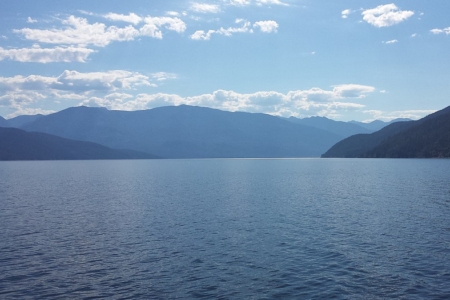Question: Trans Mountain oil pipeline expansion
There are only days of campaigning until Canadians go to the polls to elect a new government for the next four years.
During the campaign in the Kootenay Columbia riding, The Nelson Daily has pitched questions to the candidates — Abra Brynne of the Green Party, Liberal candidate Robin Goldsbury, incumbent Wayne Stetski of the NDP, Rob Morrison of the Conservative Party, Trev Miller of the Animal Protection and People’s Party of Canada and Rick Stewart prior to the Monday, October 21, 2019 vote.
Today’s Question is:
Are you in support of the Trans Mountain oil pipeline expansion? Yes or No? Please explain in detail why?
Rick Stewart, People’s Party of Canada
The People’s Party of Canada supports the Trans Mountain oil pipeline expansion so essential to our long-term prosperity. Pipelines are the safest method of transporting oil and as your Member of Parliament, I will advocate for both tidewater pipelines in BC and also Energy East so essential to Canadian energy independence and the cohesion of Canada.
To expedite pipeline construction the PPC will assert its federal power over all these interprovincial projects and declare them to the “general advantage of Canada”, as per section 92(10) of the constitution. This will immediately change the question from “should we build a pipeline?” to “what’s the best way to build the pipeline?” This will avoid endless fighting and never-ending consultation.
I am, however, not a proponent of shipping raw bitumen through our coastal waterways, as an accident would be impossible to clean up and have long lasting negative impacts on our coastal ecosystem. For that reason, upgrading should be a requirement to ensure an acceptable level of risk to the environment and create the investment and jobs Canada needs.
Rob Morrison, Conservative Party
Conservatives have a solid plan to getting Canadians working and projects built. We will repeal Bill C-69, establish clear timelines and get Indigenous consultations right up front, ban foreign-funded advocacy groups from disrupting our approvals process and assert federal jurisdiction when necessary.
A Conservative government will develop a dedicated, coast-to-coast right-of way specifically set aside for energy infrastructure projects. Rather than have industry submit complicated route proposals for every new transmission line and pipeline project, we could have a single corridor – planned up front and in full consultation with the provinces and with Indigenous Canadians who would share in the prosperity that it would provide. With a single corridor, we could minimize environmental impacts, lower the costs of environmental assessments, increase certainty for investors, and, most importantly, get these critical projects built. All while doing Canada’s part in the fight against climate change by lowering global emissions.
Wayne Stetski, NDP
I do not support the expansion of the Trans Mountain pipeline because the risks to our environment are too great and the proposed project is incompatible with ensuring a safe climate for our children and grandchildren. The climate crisis is the greatest challenge of our time and we can no longer continue with the status quo. The science is clear – we need to rapidly transition away from our dependence on fossil fuels to avoid catastrophic impacts such as extreme weather events, food shortages, poverty, and global instability.
The Trans Mountain project would facilitate the expansion of the oil sands and increased export of oil by tanker ships, both of which have the potential for irreversible environmental impacts. The National Energy Board did not consider the climate change impacts of the expansion proposal, but it is clear the project only makes economic sense if the pipeline is in service for decades. We cannot bet on the world failing to do what’s necessary to protect our climate.
The Liberal government’s $4.5 billion bailout of Kinder Morgan was a bad investment for Canadians and we should not continue to pour billions more into this project. Instead of spending taxpayers' money on pipeline expansion, we must begin building our green energy future. We need a bold plan that reduces emissions while creating sustainable jobs for workers. The NDP's “Power to Change: A New Deal for Climate Action and Good Jobs” is a plan to do just that, by investing in priorities like renewable energy, public transit, energy efficiency and research and development.
It is estimated the Trans Mountain expansion would produce 2,500 jobs during the construction phase, but only 50 long-term maintenance jobs. That is not enough to make this project valuable to British Columbia workers, compared to the potential job loss from even one coastal oil spill. Further, in interior BC, a bitumen leak would be devastating for local wildlife, lakes and rivers as well as the residents who place great value on our natural heritage.
Finally, New Democrats believe free, prior, and informed consent of First Nations must be obtained before proceeding with projects that impact constitutionally protected land rights. That standard has not been met for Trans Mountain project. We must work in full partnership with First Nations to protect our environment for present and future generations.
I am proud to be one of only 25 candidates endorsed by GreenPAC as an environmental leader and recognized as a Climate Champion by Leadnow. If re-elected, I will continue to advocate for climate action and a just transition for workers.
Abra Brynne, Green Party
The Green Party is opposed to the Trans Mountain Pipeline Expansion. Since producing and burning fossil fuels is the largest source of emissions, we need to keep them in the ground and retool our communities, so we use non-polluting, renewable energy sources. We will cancel the Trans Mountain pipeline (and its $10-13 billion cost) as well as other subsidies to fossil fuel industries, totalling an additional several billion dollars a year.
This money will be redirected to the Canadian Grid Strategy and renewable energy transition. Existing oil and gas operations will continue a declining basis, with bitumen production phased out between 2030 and 2035. The energy transition needs to be socially just and so we will create a comprehensive funding program for workers staying in the labour market to address their needs across the stages of securing a new job, including income support, education and skills building, re-employment, and mobility.
Robin Goldsbury, Liberal Party
Doesn’t matter which side of the fence you sit on this one – Canada owns a pipeline. The upside is it’s making money, just under a 5 percent rate of return, and ALL of those proceeds are earmarked for green initiatives.
Here’s the practical common sense – it’s about safety. Everyday we have trains and trucks rattling through our downtowns filled with oil products destined for the coast. The research is clear, trucks and trains are far less safe than pipelines. A few years ago I watched a train back up in the Cranbrook yard and completely derail, a block from downtown. We are gambling for another Lac-Megantic rail disaster.
The irony is the pipeline has a much smaller ecological footprint than rail and truck transport. By forcing the oil and gas sector to use truck and rail, we are creating a worse environmental situation.
Oil is not going away tomorrow. There are deep concerns about the rising energy demands from the emerging world. We, frankly, don’t make enough green energy to meet their demand. While we work furiously to grow green energy, it makes sense to export our highly regulated Canadian products, produced to the highest environmental standards. The other options are letting Russia and Saudi Arabia supply the demand, and they don’t have the same passion, respect or concern for our environment.
Absolutely, we need to build the infrastructure for Green. We need to move ahead with protecting our world by reducing carbon. But we need a strategy and the money to transition. The pipeline is part of that strategy.
We should note the pipeline was the bone given to the Alberta government for signing on to meet the Paris Accord emissions. Without Alberta on board, Canada doesn’t have a chance of meeting our obligations.
The oil and gas sector make up about 20 percent of our Canadian exports. That’s huge! Canada is the world’s fifth largest producer of oil and gas. The industry employs over 900,000 Canadians. Here’s the rub – we have some of the world’s strictest environmental regulation. Our carbon emissions are being addressed (a 40-45 percent reduction by 2025). We are leading edge in new technology, green technology, to extract and transport the oil products.
And we have only one pipeline to get our product to markets other than American. So the Americans have almost complete control over our product prices, and they have driven them well below market level. The rail lobby and foreign oil producing countries do not want to see our more environmentally friendly derived Canadian exports on the world market.
My brother started off as a millwright on the pipelines in Alberta. He is now working at the Carbon Capture plant in Squamish where they are pulling carbon out of the air. And who are the major investors? Oil and gas. This is the leading edge of where our energy sector is moving. They see the writing on the wall and are taking our carbon problem head on. We can transition. We will transition. It just needs time.
If I could turn off our carbon footprint tomorrow I would. But the practical reality is we can’t. The economic problem is call energy demand. But we can work on it. I hear the urgency and the passion. Let’s implement all we can within fiscal possibility to work toward meeting that energy demand with Green. Let’s also address the transportation safety and concerns of those who earn a living in oil and gas.
Trev Miller, Animal Protection Party of Canada
Whenever we install new pipeline infrastructure, this action delays the ultimate de-carbonization of our society by the lifetime of that infrastructure.
We need to act as though our world will not survive unless we drastically change the way we've been conducting ourselves — because it is dying. I understand how come people are in favour of pipelines as there are jobs that come with these industries. Jobs are admirable in the short-term however in a real way, as automation continues to safely replace human labour as it's designed to do, we're moving away from a job-based reality.
What people are looking for is security and stability and by eliminating subsidies to unsustainable industries, as well as greatly reducing and consolidating a bureaucracy-heavy social services sector, the Animal Protection Party of Canada's proposal for a basic income living allowance will allow everyone a means to support themselves if their employment income is less than livable at a regional level.

Trev Miller of the Animal Protection Party of Canada.

























